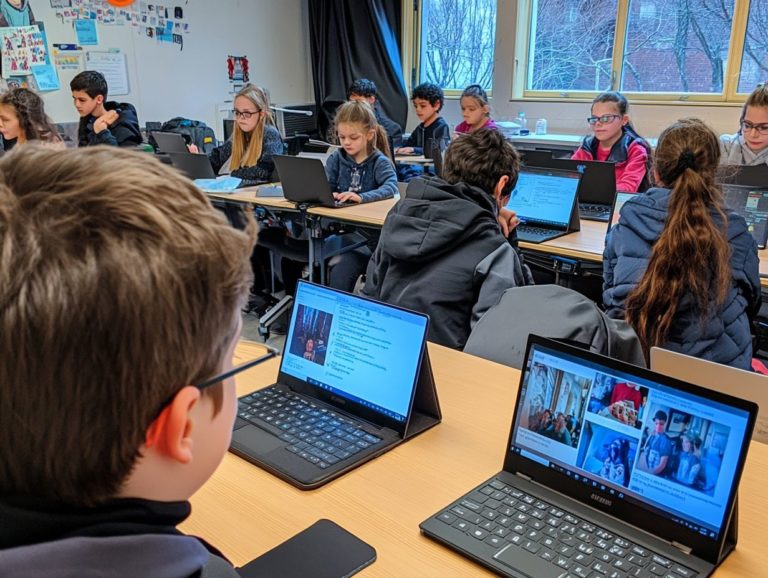E-Learning Solutions for Soft Skills Training
In today’s fast-paced workplace, mastering soft skills is your key to success! Soft skills have emerged as crucial for fostering collaboration, creativity, and productivity. Traditional training methods often fall short in addressing these needs, which is where e-learning steps in with innovative solutions to equip you with these essential skills.
This article delves into the importance of soft skills, the limitations of conventional training approaches, and how e-learning can effectively bridge that gap. You ll also receive guidance on selecting the right platform and designing impactful training courses that lead to sustainable success.
Contents
- Key Takeaways:
- The Importance of Soft Skills Training
- Challenges of Traditional Soft Skills Training
- E-Learning Solutions for Soft Skills Training
- Choosing the Right E-Learning Platform
- Designing Effective Soft Skills Training Courses
- Measuring Success and Continued Improvement
- Frequently Asked Questions
- What are e-learning solutions for soft skills training?
- What soft skills can be developed through e-learning solutions?
- How do e-learning solutions for soft skills training work?
- Can e-learning solutions for soft skills training be personalized?
- Are e-learning solutions for soft skills training effective?
- How can individuals access e-learning solutions for soft skills training?
Key Takeaways:

- Prioritize soft skills training for your success in the workplace.
- Leverage e-learning solutions for flexible and measurable progress.
- When choosing an e-learning platform, consider user experience, customization, and technology support.
The Importance of Soft Skills Training
Soft skills training is critical in today s fast-paced workplace. It encompasses vital competencies such as emotional intelligence the ability to understand and manage your own emotions and those of others effective communication, and teamwork.
Mastering these soft skills enhances your personal development and significantly boosts overall productivity and professional growth within your organization.
Unlike hard skills, which are easier to measure, soft skills cultivate relationship-building and adaptability essential traits for leadership roles and exceptional customer service.
Start investing in training programs centered on these skills today to see immediate improvements in workplace dynamics and enhanced performance outcomes.
Why Soft Skills Matter in the Workplace
Soft skills are absolutely essential in the workplace as they elevate communication, nurture teamwork, and enhance emotional intelligence among employees.
These qualities are crucial in shaping effective leadership. Leaders who possess strong soft skills can inspire and motivate their teams toward shared objectives. For example, when a manager excels at active listening, they grasp their team’s concerns more effectively and create an atmosphere where employees feel truly valued. This sense of appreciation boosts morale and fuels productivity.
In customer service, professionals with outstanding soft skills navigate complex situations with grace. This expertise helps them build robust relationships with clients and enables them to resolve issues harmoniously.
By integrating these interpersonal skills, workplace dynamics can significantly improve, leading to seamless collaboration and a thriving culture of respect and understanding.
Challenges of Traditional Soft Skills Training
Traditional soft skills training often faces a range of challenges that can impede its effectiveness. You may find that limited time and resources for both employees and organizations pose significant barriers to fully realizing the benefits of these training programs.
Limited Time and Resources
Limited time and resources can severely reduce the effectiveness of traditional training programs, often leaving you with fewer opportunities to cultivate essential soft skills.
Consequently, you may notice a decline in overall employee engagement and productivity within your organization, creating a cycle that stifles both individual and company growth. Without proper training access, employees can struggle with critical areas such as communication and teamwork skills vital for fostering a collaborative work environment.
When soft skills training is underfunded, turnover rates can increase as employees feel undervalued and unsupported in their growth efforts. This neglect impacts morale and undermines your organization s ability to adapt to shifting market demands, ultimately jeopardizing its competitive advantage.
Difficulty in Measuring Progress

Measuring progress in soft skills training presents a significant challenge for you. Traditional assessments often fall short in truly capturing behavioral change and performance improvements.
You may find it difficult to determine whether the outcomes of training translate into real-world applications, leading to uncertainty about the return on investment. This gap can be effectively addressed by integrating comprehensive feedback mechanisms that allow participants to share their experiences and perspectives after the training.
By incorporating performance metrics that specifically focus on observable behavior changes, you can gain valuable insights into the effectiveness of your soft skills initiatives.
Utilizing a blend of qualitative and quantitative data will enable you to develop a clearer picture of training impact. Ultimately, this fosters a culture of continuous improvement within your organization.
E-Learning Solutions for Soft Skills Training
E-learning solutions are transforming soft skills training, providing you with a flexible and engaging alternative to traditional training methods, including e-learning solutions for technical skill training.
It empowers organizations like yours to enhance learning experiences while adapting to the unique needs of your workforce.
Benefits and Advantages
The benefits of e-learning for soft skills training are extensive, offering increased engagement with interactive modules and the convenience of on-demand access to digital learning resources, making e-learning solutions a path to lifelong learning.
This approach caters to a variety of learning styles, creating a more immersive experience that encourages active participation. By incorporating game-like features and real-world scenarios, you ll find that developing critical interpersonal skills becomes more effective and enjoyable.
The flexibility of online platforms removes geographical barriers, allowing you to access top-notch training from anywhere, at any time.
This improved accessibility allows organizations to deliver consistent development opportunities, ultimately leading to better knowledge retention and the practical application of soft skills across various contexts.
Types of E-Learning Programs
Various types of e-learning programs have been meticulously crafted to enhance your soft skills development. Options such as online courses, interactive modules, roleplay scenarios, and coaching sessions are at your fingertips.
These formats provide not only the flexibility you crave but also engage you through a spectrum of instructional methods. For instance, online courses deliver theoretical knowledge alongside comprehensive assessments, enabling you to evaluate your understanding effectively.
Meanwhile, interactive modules invite you to dive in actively, reinforcing concepts through gamified elements and quizzes that make learning enjoyable. Roleplay scenarios transport you into realistic situations, sharpening your ability to respond adeptly in real-world contexts.
Personalized coaching sessions offer tailored feedback, guiding you in refining your interpersonal skills. Collectively, these diverse offerings create a well-rounded approach to mastering soft skills, essential for your professional advancement in today s ever-evolving work environment.
Choosing the Right E-Learning Platform
Selecting the ideal e-learning platform for soft skills training is crucial for organizations that wish to enhance the effectiveness of their training programs. Using e-learning for talent development strategies can significantly influence the overall impact and success of your initiatives.
Factors to Consider

When selecting an e-learning platform for soft skills training, consider factors like adaptability, ease of use, and the range of training programs available. Understanding how to develop soft skills through training can enhance your learning experience and keep participants engaged.
Adaptability allows the platform to fit different learning styles and skill levels, which is crucial for personal development. A user-friendly interface reduces barriers to entry, helping you focus on the content instead of dealing with technical issues.
A diverse range of training programs enables exploration of topics relevant to your personal and professional growth. This variety creates a richer and more rewarding learning environment.
Designing Effective Soft Skills Training Courses
Designing effective soft skills training courses requires careful consideration of key components that foster skill acquisition and drive meaningful change among employees.
Key Components and Strategies
Key components of effective soft skills training include interactive engagement strategies, diverse learning formats, and detailed evaluations to track your progress. Course designers should incorporate interactive scenarios that reflect real-life situations.
Engaging in role-playing exercises elevates your learning experience by allowing you to practice people skills while receiving immediate feedback. Assessments are crucial for tracking progress and offering insights into areas needing improvement.
By blending these elements, trainers can help you develop essential communication, teamwork, and problem-solving skills. This way, you leave fully equipped for the workplace.
Measuring Success and Continued Improvement
Measuring success and ensuring continuous improvement of soft skills training programs is crucial for organizations eager to boost employee performance and engagement.
Monitoring these initiatives allows organizations to refine their approach, driving meaningful development and fostering a dynamic workplace culture.
Assessment and Feedback
Effective assessment and feedback mechanisms help you understand the impact of soft skills training on employee performance. Use various methods, like evaluating your own skills, peer reviews, and manager evaluations, to get a clear view of soft skills proficiency.
Incorporating real-time feedback strategies, such as observational assessments and role-playing, enhances learning by providing immediate insights. Continuous feedback reinforces strengths and highlights areas for development, ensuring the training evolves with workplace needs.
This structured approach nurtures a culture of growth and aligns enhancing soft skills with your organizational goals.
Updating and Evolving the Training Program

It’s crucial to update your training programs. Align them with workplace changes and employee needs for success in soft skills development.
Actively seek feedback from participants. This helps refine your training initiatives and uncovers potential challenges.
Stay aware of new trends like remote collaboration tools. This evolution increases engagement and fosters behavioral changes needed for strong teams.
This, in turn, improves overall performance, ensuring your workforce remains adaptable and competitive.
Frequently Asked Questions
What are e-learning solutions for soft skills training?
E-learning solutions refer to online tools and courses designed to help individuals improve their soft skills. These skills, such as communication and teamwork, are essential in the workplace, and maximizing learning with e-learning solutions can greatly enhance their development.
What soft skills can be developed through e-learning solutions?
You can develop many soft skills, including communication, problem-solving, and leadership. Each skill is vital for workplace success.
How do e-learning solutions for soft skills training work?
These solutions include online courses covering various soft skills topics and offer e-learning solutions for upskilling employees that often feature interactive activities and assessments for effective learning.
Can e-learning solutions for soft skills training be personalized?
Yes! Many solutions offer self-paced courses and customizable content to fit individual learning styles.
Are e-learning solutions for soft skills training effective?
Research shows that e-learning can be as effective, if not more so, than traditional training. The interactive nature allows for active learning and quick feedback!
How can individuals access e-learning solutions for soft skills training?
You can find e-learning solutions on various platforms, including company training portals and mobile apps. Some courses are free, while others may require payment.






